Filter by
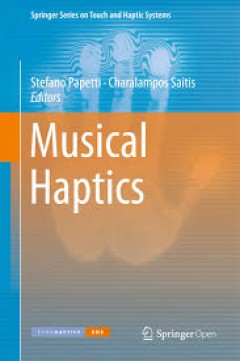
Musical Haptics
This open access book offers an original interdisciplinary overview of the role of haptic feedback in musical interaction. Divided into two parts, part I examines the tactile aspects of music performance and perception, discussing how they affect user experience and performance in terms of usability, functionality and perceived quality of musical instruments. Part II presents engineering, compu…
- Edition
- -
- ISBN/ISSN
- 978-3-319-58316-7
- Collation
- XV, 285
- Series Title
- Springer Series on Touch and Haptic Systems (SSTHS)
- Call Number
- 001 MUS
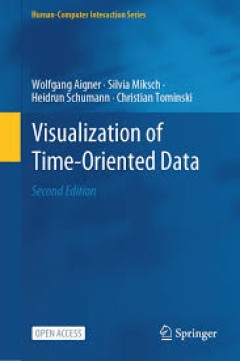
Visualization of Time-Oriented Data
This is an open access book. Time is an exceptional dimension with high relevance in medicine, engineering, business, science, biography, history, planning, or project management. Understanding time-oriented data via visual representations enables us to learn from the past in order to predict, plan, and build the future. This second edition builds upon the great success of the first editi…
- Edition
- -
- ISBN/ISSN
- 9781447175278
- Collation
- XIX, 441
- Series Title
- -
- Call Number
- -
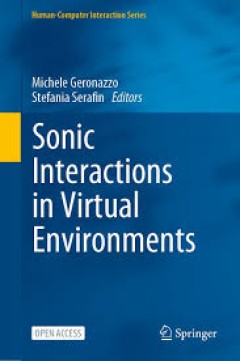
Sonic Interactions in Virtual Environments
This open access book tackles the design of 3D spatial interactions in an audio-centered and audio-first perspective, providing the fundamental notions related to the creation and evaluation of immersive sonic experiences. The key elements that enhance the sensation of place in a virtual environment (VE) are: Immersive audio: the computational aspects of the acoustical-space properties of Vi…
- Edition
- 1
- ISBN/ISSN
- 978-3-031-04021-4
- Collation
- -
- Series Title
- Human–Computer Interaction Series
- Call Number
- XXII, 428

Interdisciplinary Insights for Digital Touch Communication
Communication is increasingly moving beyond ‘ways of seeing’ to ‘ways of feeling’. This Open Access book provides social design insights and implications for HCI research and design exploring digitally mediated touch communication. It offers a socially orientated map to help navigate the complex social landscape of digitally mediated touch for communication: from everyday touch-screens…
- Edition
- -
- ISBN/ISSN
- 9783030245641
- Collation
- XVII, 131
- Series Title
- -
- Call Number
- -

The Art of Sustainable Performance : A Model for Recruiting, Selection, and P…
This open access book revisits common notions on how to select and recruit the right employees. It reveals that the secret of successful individuals and teams lies in a combination of talent and four important performance indicators, offering an innovative approach that companies can fruitfully adopt. Bas Kodden has studied key performance indicators among over 1,100 executives, senior staf…
- Edition
- -
- ISBN/ISSN
- 978-3-030-46463-9
- Collation
- XXI, 120
- Series Title
- SpringerBriefs in Business (BRIEFSBUSINESS)
- Call Number
- 658 KOD a

National Constitutions in European and Global Governance: Democracy, Rights, …
This two-volume book, published open access, brings together leading scholars of constitutional law from twenty-nine European countries to revisit the role of national constitutions at a time when decision-making has increasingly shifted to the European and transnational level. It offers important insights into three areas. First, it explores how constitutions reflect the transfer of powers fro…
- Edition
- 1
- ISBN/ISSN
- 9789462652736
- Collation
- XXIV, 1522 hlm,: ill, lamp;
- Series Title
- -
- Call Number
- -
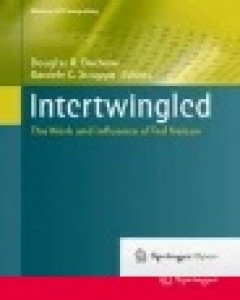
Intertwingled: The Work and Influence of Ted Nelson
This engaging volume celebrates the life and work of Theodor Holm “Ted” Nelson, a pioneer and legendary figure from the history of early computing. Presenting contributions from world-renowned computer scientists and figures from the media industry, the book delves into hypertext, the docuverse, Xanadu and other products of Ted Nelson’s unique mind. Features: includes a cartoon and a sequ…
- Edition
- -
- ISBN/ISSN
- 978-3-319-16925-5
- Collation
- XVI, 150
- Series Title
- History of Computing (HC)
- Call Number
- 001 INT

The Hackable City : Digital Media and Collaborative City-Making in the Networ…
This open access book presents a selection of the best contributions to the Digital Cities 9 Workshop held in Limerick in 2015, combining a number of the latest academic insights into new collaborative modes of city making that are firmly rooted in empirical findings about the actual practices of citizens, designers and policy makers. It explores the affordances of new media technologies for em…
- Edition
- 1
- ISBN/ISSN
- 9789811326943
- Collation
- XV, 302 hlm,: ill, lamp;
- Series Title
- -
- Call Number
- -

Professions and Proficiency
This open access book takes an original view on the social production of knowledge in and across space. It explores how people build and transfer proficiency within and beyond the bounds of social groups. Social groups, such as professions, epistemic communities, or academic disciplines, collectively organize to help individuals gain understanding of and knowledge about specific subjects of exp…
- Edition
- -
- ISBN/ISSN
- 978-3-031-24910-5
- Collation
- X, 270
- Series Title
- Knowledge and Space (KNAS, volume 18)
- Call Number
- 334 PRO
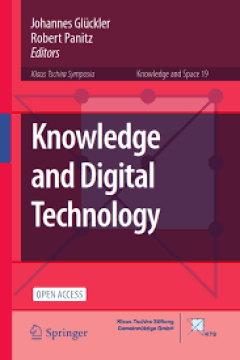
Knowledge and Digital Technology
This open access book explores the multifaceted interplay of technology, knowledge, and place. While digital technology is increasingly influencing our way of knowing, conversely it is itself the consequence of human creativity and local social interaction. Part I analyzes how digital technologies transform markets through artificial intelligence and decentralized blockchain models. Its contrib…
- Edition
- -
- ISBN/ISSN
- 978-3-031-39101-9
- Collation
- X, 289
- Series Title
- Knowledge and Space (KNAS, volume 19)
- Call Number
- 334 KNO
 Computer Science, Information & General Works
Computer Science, Information & General Works  Philosophy & Psychology
Philosophy & Psychology  Religion
Religion  Social Sciences
Social Sciences  Language
Language  Pure Science
Pure Science  Applied Sciences
Applied Sciences  Art & Recreation
Art & Recreation  Literature
Literature  History & Geography
History & Geography